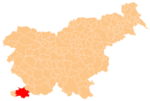Pier Antonio Quarantotti Gambini
This article needs additional citations for verification. (February 2013) |
Pier Antonio Quarantotti Gambini | |
|---|---|
| Born | 23 February 1910 Pisino d'Istria, Austria-Hungary |
| Died | 22 April 1965 (aged 55) Venice, Italy |
Pier Antonio Quarantotti Gambini (Italian pronunciation: [ˈpjɛr anˈtɔːnjo kwaranˈtɔtti ɡamˈbiːni]; February 23, 1910 – April 22, 1965) was an Italian writer and journalist, author of novels, poetry, and essays.
Biography[]
Quarantotti Gambini was born in Istria, then part of Austria-Hungary, in an Italian family from Rovigno. His father was a prominent Italian irredentist militant in Istria. He spent his childhood there, in the vicinity of Capodistria, a place which would figure in many of his novels. Istria was integrated into the Kingdom of Italy in 1919 as a result of World War I, fulfilling the aspirations of Quarantotti's father.
Quarantotti Gambini met Richard Hughes in 1927, as the English writer was travelling in Istria, and received literary advice from him. He became friends with Umberto Saba in 1929 in Trieste. He left Capodistria soon after to study law in Milan and Turin. In 1932, he published his first short stories, collected in the volume I nostri simili. From 1933, he worked for the newspaper La Stampa. He was sent as a war reporter to cover the Ethiopian War, then the Spanish Civil War. In 1937, his first novel, La Rosa Rossa was published by the publisher Treves, in Milan.
During World War II, he was director of the city library of Trieste, from where he had to flee in 1945 when Josip Broz Tito's Yugoslav Partisans entered the city. He settled in Venice, where he lived the rest of his life. From 1945 until 1949, he was head of a semi-clandestine radio aimed at Italians in the Free Territory of Trieste, Radio Venezia Giulia. He was an advocate for an independent Istria, but the London memorandum of 1954 partitioned the Free Territory, giving Trieste to Italy, but the rest of Istria to Yugoslavia. From then on, Quarantotti Gambini was not authorized to visit the places of his birth and youth. His major works date from this period of exile, and are heavily autobiographical (Amor militare, 1955, Il Cavallo Tripoli). His 1958 novel La Calda Vita is a subtle exploration of the transition from childhood to adulthood, its sensuality and cruelty.[1]
He received the Bagutta Prize in 1948 for L'Onda dell'incrociatore. In 1963, he was a member of the jury of the Campiello Prize.
Selected work[]
Prose[]
- , Solaria, Firenze 1932
- , Treves, Milano 1937; Einaudi, Torino 1972
- , Einaudi, Torino 1947 / Oscar Mondadori, 1966 / Palermo: Sellerio, 2000
- , Mondadori, Milano 1955
- , Mondadori, Milano 1956
- , Mondadori, Milano 1958
- , Einaudi, Torino 1964
- , Einaudi, Torino 1964
Poetry[]
- , Mondadori, Milano 1965
- , Edizioni Einaudi 1971
Essays[]
- , Mondadori, Milano 1951
- , Mondadori, Milano 1963
- , Eri, Torino 1964
- , Disputazione di storia patria per le Venezie, Venezia 1968
Correspondence[]
- , Mondadori, Milano 1965
References[]
- ^ Katia Pizzi (2001). A city in search of an author: the literacy identity of Trieste. Continuum International Publishing Group. pp. 79–. ISBN 978-1-84127-284-9. Retrieved 25 February 2012.
- The first version of this article was based on its counterparts in the Italian and German Wikipedias: it:Pier Antoinio Quanrantotti Gambini and de:Pier Antonio Quarantotti Gambini. Both are licensed under the GFDL.
- 20th-century Italian novelists
- 20th-century male writers
- Italian male short story writers
- Italian Austro-Hungarians
- People from Austrian Littoral
- People from Pazin
- 1910 births
- 1965 deaths
- Italian male novelists
- 20th-century Italian short story writers

